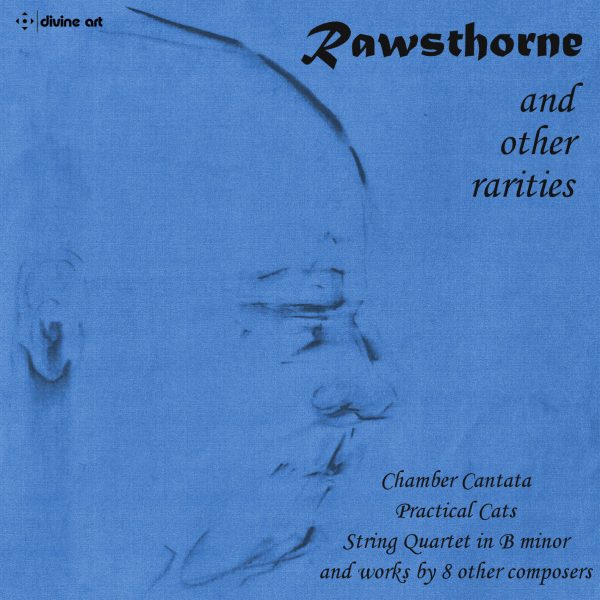Musical Opinion
This real hodgepodge of a disc is all the more entertaining for it. Recorder player and Rawsthorne expert John Turner is the motivating force behind it all, playing in seven of the eleven pieces; ironically, in none of Rawsthorne’s works, including the 1939 Chamber Cantata, for long lost but rediscovered by Turner in the Library of Congress in Washington, DC. While by no means the longest work here, this four- movement piece for mezzo-soprano, string quartet and harpsichord is the major item here, setting three anonymous medieval texts and, in the finale, Alexander Montgomerie (a 16th-century Scot). The Chamber Cantata‘s loss was lamented by Rawsthorne’s biographer, the late John McCabe … to whose memory, incidentally, this album is dedicated – and hearing it now one can but aver his judgment was well-founded. It is an absolute gem, and very strongly sung here by Claire Wilkin¬son, well supported by the Solem Quartet and harpsichordist Harvey Davies. Claire Wilkinson also delivers Basil Deane’s diptych The Rose Tree (2006, in Raymond Warren’s completion made two years later) and the two brief songs by Bliss (1921, arr c.1924) and Vaughan Williams (cl939).
The Chamber Cantata‘s manuscript came to be in the Library of Congress as part of the collection of the composer and musicologist Halsey Stevens, whose Sonatina Piacevole (1955-6) is included here by way of tribute. A brief work of neoclassical perfection, if no great depth, it is beautifully performed by Turner and Davies, as they do Donald Waxman’s sprightly, more recent Serenade and Caprice (2016). Turner also plays two works unaccompanied, Karel Janovický’s lovely variation set, The Little Linden Tree (2016), and the late Malcolm Lipkin’s tribute (one of several) to McCabe, The Journey (2016), after the completion of which Lipkin sadly departed on a journey of his own. The disc closes with another Liverpudlian tribute to McCabe, that of David Ellis, a family friend from the 1920s and named from Mount Street, where they both attended the Liverpool Institute.
Rawsthorne remains the principal focus of the disc, however, and the other two discs reveal much about his range as a composer, his technical prowess and sense of humour. Practical Cats (1954) sets six of TS Eliot’s twinklingly gleeful poems from Old Possum’s Book of Practical Cats for a carefully notated reciter and small orchestra. Rawsthorne made a partial and somewhat unplayable piano reduction, which Peter Dickinson edited and-in the case of ‘Old Deuteronomy – arranged from scratch in 2014. It is an absolute delight, beautifully rendered by Mark Rowlinson and Peter Lawson. But then so too is the Solem Quartet’s interpretation of the early unnumbered String Quartet in B minor (1932-3). This has been recorded before, by the Flesch Quartet for ASV, but this is a fine rival, the Solem’s rigour in the opening Fugue very impressive, but their account of the remaining two movements is no less so. Great sound throughout.
@divineartrecordingsgroup
A First Inversion Company
Registered Office:
176-178 Pontefract Road, Cudworth, Barnsley S72 8BE
+44 1226 596703
Fort Worth, TX 76110
+1.682.233.4978










![Listen to the full suite of Marcel Dupré’s Variations Sur un Noël, Op. 20 from Alexander Ffinch’s #Expectations release today! listn.fm/expectations [in bio]](https://scontent-dfw5-1.cdninstagram.com/v/t51.71878-15/588904367_2327488161082898_8709236950834211856_n.jpg?stp=dst-jpg_e35_tt6&_nc_cat=105&ccb=7-5&_nc_sid=18de74&efg=eyJlZmdfdGFnIjoiQ0xJUFMuYmVzdF9pbWFnZV91cmxnZW4uQzMifQ%3D%3D&_nc_ohc=AiUKMpkx7d0Q7kNvwF903qp&_nc_oc=AdmjPfGMLFAch_qpE2uUo3NAYvZFjq0C7oXT7cj84Kaxy1RAWOfA1YnXUqSWMBh3nqo&_nc_zt=23&_nc_ht=scontent-dfw5-1.cdninstagram.com&edm=ANo9K5cEAAAA&_nc_gid=d9Z9WSfd71mO5QgkSUsgVg&oh=00_AfmK4V6gBH-2WaoPVeJSQh58CKpRyVvoiyi24_CenaOEDQ&oe=69544FEA)

![“the ‘Manteca’ Paraphrase – a rare foray into the two-piano medium but here played double-tracked – exudes a panache of which Dizzy Gillespie would surely have approved.… [a] recital well worth investigating.” —Gramophone Magazine with high praise for Ophelia Gordon's debut release, Kapustin: Between the Lines!](https://scontent-dfw5-3.cdninstagram.com/v/t51.82787-15/598796470_18303255136283342_540941604740887837_n.jpg?stp=dst-jpg_e35_tt6&_nc_cat=108&ccb=7-5&_nc_sid=18de74&efg=eyJlZmdfdGFnIjoiRkVFRC5iZXN0X2ltYWdlX3VybGdlbi5DMyJ9&_nc_ohc=IC4zZ7tcpb8Q7kNvwHcGcB-&_nc_oc=Adl7zwfdQZs1l8cjZQVt9d1r7lPe9iCnwEbvptYQYyh4Ip8ZPHhvuOyVlrbh3rekvmM&_nc_zt=23&_nc_ht=scontent-dfw5-3.cdninstagram.com&edm=ANo9K5cEAAAA&_nc_gid=d9Z9WSfd71mO5QgkSUsgVg&oh=00_AfnIpklbM6nnoqT6BzayHijxykVMCp3WJg_Lph65wfntbQ&oe=69546284)